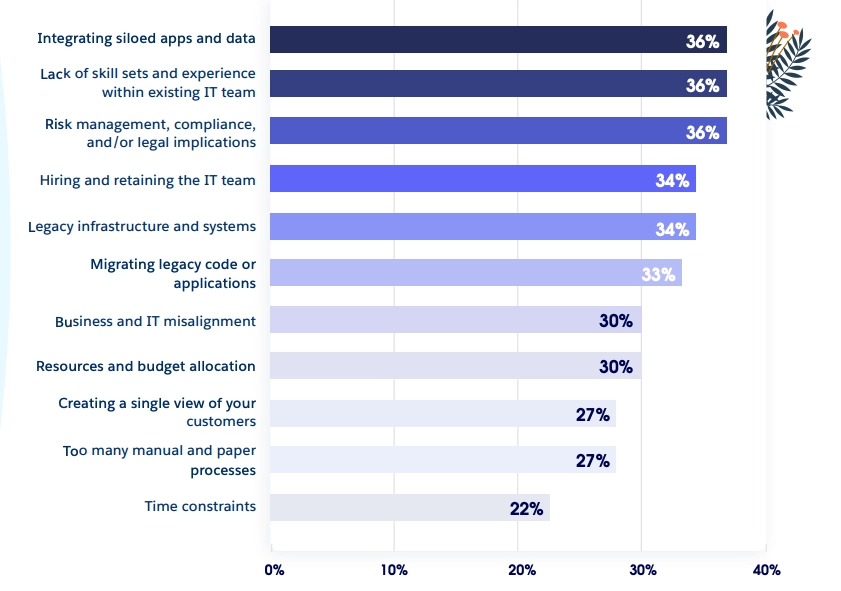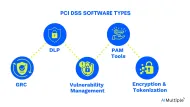Businesses are struggling with app sprawl, as the average business uses ~370 apps. App sprawl leads to employees copying and pasting across applications, leading to slow and error-prone processes.
An integration platform as a service solution (iPaaS) or an enterprise automation platform can resolve this issue. However, selecting these solutions for your company is difficult since:
- There are around 100 iPaaS tools in the market.
- Pricing can be opaque, with high prices blocking widespread usage and digital transformation.
- These tools tend to be closed source, making it hard to switch vendors once you invest in one. Therefore, we recommend that companies evaluate their options carefully.
See the list of affordable iPaaS tools that offer the same number of features as expensive ones but at lower prices.
| Vendor | Pricing per year | Trial period | # of pre-built connectors | Automation capabilities |
|---|---|---|---|---|
| Argos Labs | $2,000 | 60-day full version | Unlimited with SDK | Python backend low-code RPA for unlimited automation steps |
| Albato | $1,692 | 7-day | +500 | Yes, but limited to 30,000 automation steps every month. After that, it’s 1 cent per each step. |
| Dataddo | $1,200 for 3 data flows and 15 data sources | 14-day, in addition to a limited-version free version | +200 | Yes |
| Elastic | $2,400 | 14-day | +100 | Yes |
| Integrately | $2,868 | 14-day | 1,000 | Yes |
| Tibco | $4,800 | 30-day | +200 | Add-on |
There are over +100 iPaaS sales and marketing tools around. Our main criterion is affordability. But we can’t sacrifice quality for price. We also can’t test out all iPaaS solutions independently. So our selection benchmark for an affordable iPaaS provider is:
- A vendor with +25 employees
- Publicly available pricing of <$5,000/year
- An enterprise-level iPaaS solution capable of hybrid integration between cloud and on-premises apps
- Offering a low-code solution, +200 pre-built connections, error-handling and monitoring, and automation capabilities
These vendors passed our checklist:
1. Argos Labs
Argos Labs’ intelligent automation is a low-code integration tool built on Python. Its API management feature enables effortless integration between different SaaS apps, integrating cloud, AI/ML, and data science tools.
Key Features:
- API management integrated with cloud, AI/ML, and data science tools.
- Unlimited pre-built connectors when using their SDK.
- Low-code approach for RPA (Robotic Process Automation).
2. Albato
Albato has more than 500 in-built API connectors for application integration. Users can also create an integration marketplace from scratch.
Key Features:
- Wide range of integrations suitable for various SaaS applications.
- Automation up to 30,000 steps per month (beyond which additional steps cost 1 cent each).
3. Dataddoo
Dataddoo is now added as a notable vendor offering cost-effective data integration solutions designed to streamline workflows between multiple data sources.
Key features:
- Allows 3 data flows with 15 data sources under its base offering.
- Comes with over 200 pre-built connectors that facilitate hybrid integration.
- Supports automation capabilities to create intelligent workflows.
4. Tibco
Tibco Cloud is a low-code tool that offers over +200 API connectors. Users can integrate data, apps, cloud, SaaS, and IoT devices with their basic package.
Key features:
- Focus on scalability and flexibility for complex integration needs.
- Includes add-on capabilities to extend core functionality.
5. Integrately
Integrately can connect with over +1000 apps for data and application integration. It can also integrate with on-premise apps as long as they’re public or have webhooks.
Key features:
- Extensive app connectivity, including data and application integration.
- Simplifies automation workflows with minimal configuration.
6. Elastic
Elastic.io is a cloud integration platform designed for business users to integrate different cloud-based and on-premise solutions, enabling seamless data exchange between them.
Key features:
- Provides pre-built connectors designed for business users.
- Automation capabilities for efficient business processes.
Other vendors
In addition to these, other iPaaS marketing tools did not meet one or more of our criteria. Most vendors were not added to the list since they either didn’t offer transparent pricing, low cost, or a hybrid integration model. You can see some of those vendors below:
- MuleSoft
- Zapier
- Boomi
- Oracle integration cloud service
- Cleo integration cloud services
- Talend cloud data integration platform
If you are looking for more automation capabilities on top of iPaaS capabilities, check out our whitepaper covering low-cost automation providers:
Why is an integration platform as a service (iPaaS) important?
Integration Platform as a Service (iPaaS) plays a significant role in enterprise integration in today’s digital business environment for several reasons:
- Efficient data management: iPaaS tools have API management capability, allowing businesses to connect various applications and systems for efficient data exchange, data security, and easy data accessibility.
- Real-time integration: iPaaS solutions can provide real-time or near real-time integration capabilities, ensuring that data across systems is always current.
- Automated business processes: iPaaS solutions with intelligent automation capabilities can enable trigger-based automation workflows by synchronizing data across various applications.
- Scalability, flexibility, and agility: iPaaS solutions can be highly scalable because of their cloud-based architecture. This allows them to adjust to changes in data volume, integration complexity, or system demand without needing additional infrastructure.
- Reduced IT complexity: With an iPaaS, businesses can reduce the complexity of their IT environments and free up their IT teams.
- Cost savings: Automation and synchronization of processes reduce manual work and increase resource utilization. In addition, an iPaaS platform doesn’t require a physical infrastructure, which translates to cost savings.
What is cost-effective iPaaS software?
Cost-effective iPaaS is a cloud-based integration platform that allows businesses to integrate their different applications, various data sources, and processes across different cloud services and on-premise environments.
Companies need an affordable iPaaS solution because:
- Custom integration is costly, with organizations spending $4.7M on custom integration last year.
- 30% suffer from resource and budget allocation issues:

- High upfront and maintenance costs associated with integration solutions can deter smaller enterprises with tighter budgets
4 main features of iPaaS tools
1. Pre-built connectors
Pre-built connectors are software components for communication and data exchange between different applications without requiring custom development. Each connector is specifically designed to interact with a particular application’s API or data format. It’d know how to connect apps with:
- Authenticate the app
- Structure requests to the API
- Handle any special requirements or quirks of the API
These are developed and tested by experts and can save a lot of time and effort. Instead of understanding the details of an application’s API and writing custom code to interact with it, you can use a pre-built connector for API integrations.
For example, if an iPaaS platform has pre-built connectors for Salesforce, Slack, and Google Sheets, you can quickly and easily create API management and custom integrations with a drag-and-drop interface without writing any code.
2. Low-code
A no-code iPaaS tool provides a user-friendly interface for creating integration flows with drag-and-drop interfaces, dropdowns, and other graphical elements without needing to write any code.
This is beneficial because it democratizes the technology and appeals to a broader range of non-technical users without relying on developers or IT. It also speeds up the integration process since there’s no need to write, test, and debug code.
However, it’s worth noting that no-code doesn’t necessarily mean limited. Many no-code iPaaS platforms offer powerful capabilities and flexibility, with options to handle complex data transformations, multi-step workflows, error handling, and more.
3. Error-handling and monitoring
Error-handling and monitoring ensure that your app integrations always run smoothly, allowing you to identify and address problems quickly.
Error handling
Error-handling is when the iPaaS integration solution can detect when the execution of an integration workflow has gone wrong. It would:
- Send a notification to the administrator
- Attempt a retry
- Execute a fallback or an alternative process
Many iPaaS platforms allow users to create customized error-handling based on their needs, such as defining the number of retry attempts or specifying IF/THEN scenarios for alert sending.
Monitoring
Monitoring hybrid integration platforms involves continuously tracking and recording the activity and performance of your integration workflows. Monitoring in an integration platform as a service may include:
- Real-time dashboards display the status of your integrations, such as the number of tasks executed, data processed, successful completions, and failures.
- Logs of activity for each workflow, including details of any errors that have occurred.
- Alerts or notifications when conditionals are met, such as a high error rate or a workflow that takes longer than expected to complete.
Monitoring is essential for maintaining the reliability of key integration features, understanding their performance and usage, and identifying areas where they may need to be improved or scaled.
4. Automation capabilities
Automation capabilities allow the integration platform to do more than just data integration. So the solution isn’t limited to transferring data, but also can automate processes by applying rules, conditions, or transformation to the data, performing these on a schedule or when triggered.
For your sales and marketing apps, for instance, an integration platform as a service with automation capabilities allows you to set up a workflow that automatically syncs new customer data from your eCommerce platform to your email marketing system every night at midnight. Or you could create a process that monitors your CRM for new sales deals, and automatically sends a notification to a Slack channel and updates a record in the financial system when each is closed.
An iPaaS without automation capabilities would simply move data from one system to another without the ability to apply complex rules, transformations, or scheduling. While this can still be useful for certain use cases, it’s less flexible and powerful than an iPaaS with full automation capabilities.
For more on integration
To learn more about integration providers, read:
If you have questions or need help in finding vendors, we can help:



Comments
Your email address will not be published. All fields are required.